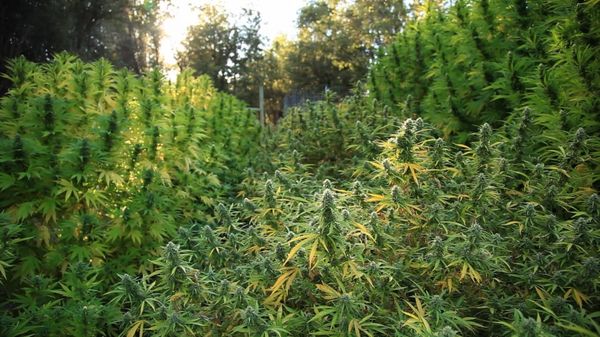
As we are noticing a progression in the area cannabis legislation, we are noticing a progression in the area of organic growing as well. While legalization continues to occur, an insurmountable amount of product has already hit the shelves of dispensaries, and will hit shelves soon after harvest – more than ever before in United States history. Some carefully produced with safeguards in place, and some mass produced with little to no quality control. Unwanted side effects of said production have already been witnessed in the form of mold, pesticides, and harmful chemicals in the end product.
States have stepped up and individually placed measures to protect consumers from the very products they consume. Many of which they judge solely on the THC %, visually appealing graphic logo, or even worse – bag appeal. One solution is growing cannabis organically, but what exactly is organic growing? Can I grow organically with bottled nutrients? Can I grow organically with soil amendments? Where do microbes play a role in organic growing? What are we trying to achieve with organic growing? What’s the future of organic growing?
Bottled Nutrients
If you’ve ever stepped foot into a hydroponic store, you’ve probably been overwhelmed with the number of products available – many with catchy names, brands, and some of the most creative looking labels. That being said, many products out there claim to be “organic” or use the wording in their products. Many small-scale growers turn to bottled nutrients out of convenience, and follow a feeding schedule set by the manufacturer that is pretty easy to follow. At the bottom of the organic tier come organic bottled nutrients, labeled with the OMRI logo.
While it may be time consuming, capital intensive, and an overall headache to get a particular organic certification one of the most reputable certifications available is by OMRI (Organic Materials Review Institute). OMRI’s stringent guidelines and a rigorous review process are reasons why few bottled nutrient manufacturers seek certification. If you are interested in organic growing, keep an eye out for this logo.
Organic Growing

There are many definitions and methods of organic growing. Our definition starts at the very beginning with organic inputs…those which carry the OMRI certification or are grown by local co-op farmers here in the Santa Cruz area. We’re very fortunate to have a community focused on permaculture and sustainable farming. In other areas, this might prove more difficult, although certainly not impossible.
We’ll begin with a list of soil amendments. Just a few of the amendments we utilize are locally sourced earthworm castings, blood meal, and bone meal. The main difference between these organic amendments, unlike synthetic compounds, lies in their ability to be broken down and utilized by the plant. Whereas many synthetic compounds are instantly utilized by the plant, organics must be broken down further into a form that is bioavailable. Synthetics not utilized by the cannabis plant may build up in the soil in the form of unwanted salts. This is a main reason why growers incorporating synthetics must “flush” their plants for a week or two at the end of the flowering phase to help prevent these synthetics from creating a harsh smell, taste, or flavor to their dried and cured finished product. As discussed earlier, organic compounds must be bioavailable before they may be utilized by the plant, and that is where microbes come into play.
Microbes
These are the silent workhorses of organic farming and cultivation. Effective organics relies heavily on the mutually beneficial relationship between the plant and the fungi and bacteria within the rhizosphere(root zone). In biology, this is referred to as a symbiotic relationship – one where both organisms benefit as a result of working closely with each other. Atmospheric carbon dioxide (CO2) absorbed by the plant is broken down into carbon (C), separated from the oxygen molecule (O2), and distributed to the rhizosphere where it is consumed by the microbes as food.
The broader the spectrum of microbes, the more likely organic compounds may be utilized by the plant. The results are healthy, fast growing plants that perform under a wide range of growing methods, nutrient regimens and pH levels.

For this article, we’ll discuss and evaluate a microbial inoculant that has worked very well for us in the flowering stage of cannabis cultivation – Mammoth P, which is OMRI listed. Developed by GrowCentia’s founders at Colorado State University, and proven through university trials Mammoth P contains beneficial bacteria capable of naturally cycling more phosphorus and other micro-nutrients in the plant-root system, thus enhancing release of the nutrients for uptake. The research involved examining hundreds of different microbial communities from indigenous soils collected across the United States. Using their phenotyping platform, they selectively bred microbes at the community level for their ability to cycle phosphorus. After propagating thousands of successive generations, a climax community was reached which was capable of cycling phosphorus at over 30x higher levels than they observed from microbes in natural soils. Industry growers call this process “phenotype hunting” – which can obviously be applied at the microbial level as well. (Honu Organics is in no way affiliated with Growcentia or Mammoth P, nor do we benefit in any way from the mentioning them in this article.)
Takeaways
The goal at Honu Organics has always been the achievement of a “living soil” ecosystem. In our soil we strive to create symbiotic relationships between our plants and the inhabitants of the medium they live in. That, to us, is the biggest difference between organic and synthetic growing. Instead of feeding the plant, we feed the soil – which in turn creates a sustainable environment, capable of meeting, and exceeding the needs of the plant. This allows the plant to truly express it’s full genetic potential.
J.T. Sands is a master grower with Honu Organics. With over 25 years growing experience, Honu Organics prides themselves on organic craft grade medical cannabis.
Related Articles & Free Email Newsletter
The Case for Auto-Flowering Cannabis Seeds
The Importance of Silicon in Cannabis Production



Comment here